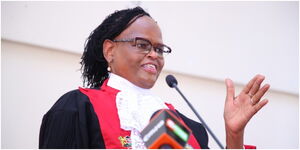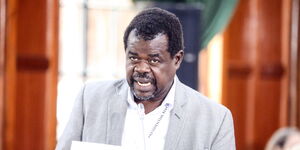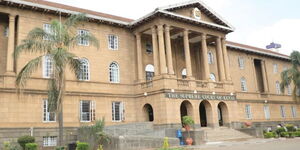The contentious Computer Misuse and Cybercrimes (Amendment) Act, 2024, suffered another blow on Monday after the Kerugoya High Court issued a conservatory order suspending the implementation of the Act.
In his ruling, Justice Edward Muriithi certified the new petition filed by Kirinyaga Woman Representative Jane Njeri Maina as urgent and temporarily suspended Section 6(1)(a) of the contested law for seven days pending further directions.
"It is hereby ordered that the application seeking conservatory orders pending hearing of a petition for a 'Declaration that the enactment of the Computer Misuse and Cybercrimes (Amendment) Act, 2025 without the involvement of the Senate, despite touching on matters concerning county governments under Part 2 of the Fourth Schedule, was unconstitutional, null and void for want of compliance with Articles 96 and 110(1)(a) of the Constitution', and consequential permanent injunction is certified urgent in view of the Reliefs sought," the ruling read.
In Njeri Maina's petition, the lawmaker contended that the enactment of the amendments without the participation of the Senate was unconstitutional.
She argued that the law touches on matters touching matters affecting county governments, hence, the need for intervention from the Senate is required under Articles 96 and 110(1)(a) of the Constitution when a Bill affects counties.
Justice Muriithi hence directed that the petition and application be served on the State Law Office, the National Assembly and other respondents ahead of a mention on November 3 for further directions on the hearing.
“The application seeking conservatory orders pending hearing of the petition for a declaration on the unconstitutionality of the Act is certified urgent in view of the reliefs sought,” the judge added.
The Computer Misuse and Cybercrimes (Amendment) Act, 2025 was assented to on Wednesday, October 15, by President William Ruto, albeit with resistance from a large section of Kenyans.
Incidentally, the new court ruling comes days after Justice Lawrence Mugambi issued similar conservatory orders, which specifically barred the implementation of Section 27(1)(b), (c), and (2) of the amended Act. In her petition, Women Rep Njeri Maina also pointed to these sections, saying grant sweeping powers to the National Computer and Cybercrimes Coordination Committee without judicial oversight.
She adds, "...sweeping censorship powers without judicial oversight, without procedural safeguards, and without due process. It is vague and overbroad in its wording, using terms such as 'unlawful activities' and 'extreme cultic practices' which are undefined, thereby conferring unfettered discretion and opening the door to arbitrary enforcement."
These were the sections of the Computer Misuse and Cybercrimes Act that received changes in the bill introduced to Parliament in August 2024.
The judge decided to issue conservatory orders pending the hearing of a petition by one Reuben Kigame and the Kenya Human Rights Commission (KHRC), who moved to court a day earlier to challenge the Act. The two argue that the amendments will significantly curtail digital freedom and freedom of expression in Kenya.
For this case, the hearing is slated for November 5, where the matter is expected to be subjected to a full hearing or other procedural determinations.
The amendment of the Computer Misuse and Cybercrimes Act, Cap 79C, prohibits the use of electronic media to promote extremism and extreme religious and cultic practices.
Under the new law, computer misuse has been expanded to mean any unauthorised system access or modification, and acts of cybercrime will include ICT-enabled offences targeting networks or data.












